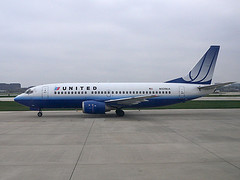
- Image by cliff1066â„¢ via Flickr
The New York Times reports that Continental and United Airlines agreed today to a merger that would create the world’s biggest airline. United is buying Continental, and the new company will be based in Chicago, and will have Jeffrey Smisek, Continental CEO, as the Chief Executive.
The merger will likely result in decreased capacity on routes where the carriers formerly competed with each other. Here are some facts about the new carrier:
- 21 percent of domestic capacity, compared to 20 percent by Delta Air Lines.
- Globally, it would be a 7 percent market share
- A 40 percent market share at San Francisco, and 35 percent at O’Hare, 64 percent at Houston Intercontinental, and 55 percent at Newark Liberty.
- 370 destinations, 59 countries.
- Hubs in Houston Intercontinental, Chicago O’Hare, Newark Liberty, Cleveland, Los Angeles, San Francisco, Denver, Washington-Dulles, Guam and Narita, Japan.
The two airlines do have some non-overlapping areas that will become strengths. Continental has a strong Latin American service, which United does not have. United has a strong Pacific service, which Continental does not have. Continental has a well liked catering program, where United does not. Continental has a better customer service reputation overall, but the Continental name will be going away.
And where will the cuts be? Cleveland may be the most likely to lose to Chicago and Newark. We tend to agree with Upgrade Travel’s Mark Ashley, who commented that if even if mergers mean that fares will increase due to reduced capacity and stronger market domination, new carriers will seize the opportunities. JetBlue has grown phenomenally in its first decade partially due to gaps left by other carriers. He suggests the biggest benefits are reaped by the competition, who get to raise fares and exploit new opportunities without the costs of a merger.
Related articles by Zemanta
- United’s Board Approves Merger With Continental (nytimes.com)
- Source: Boards OK Continental-United merger (msnbc.msn.com)